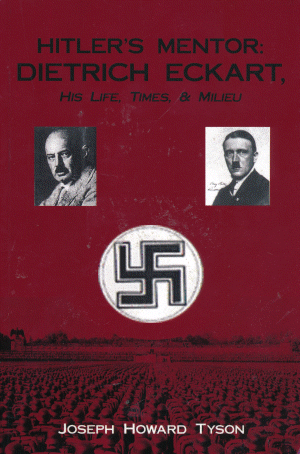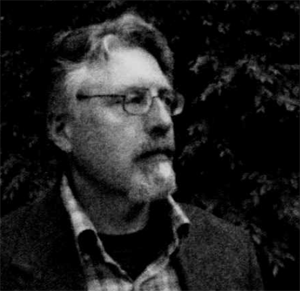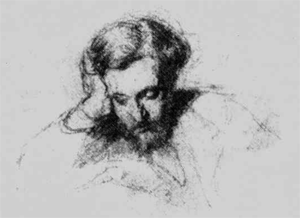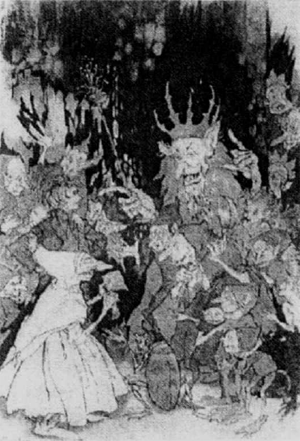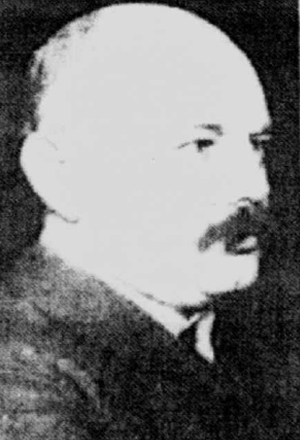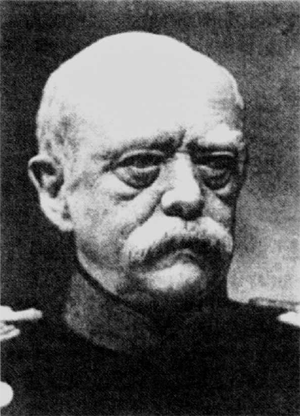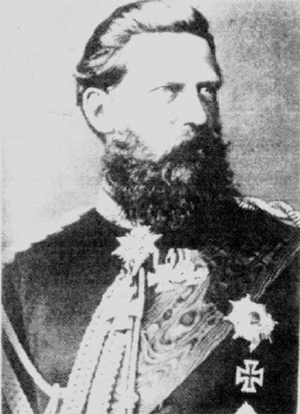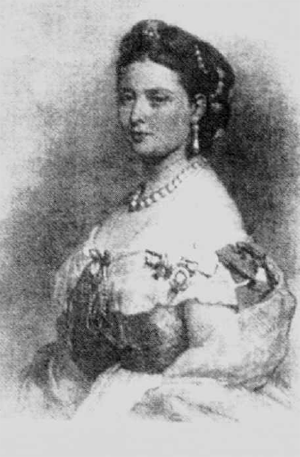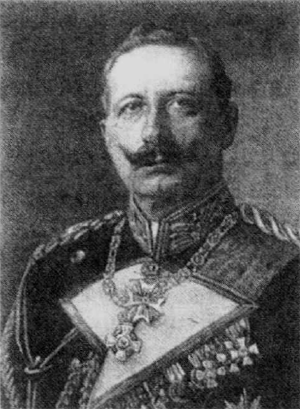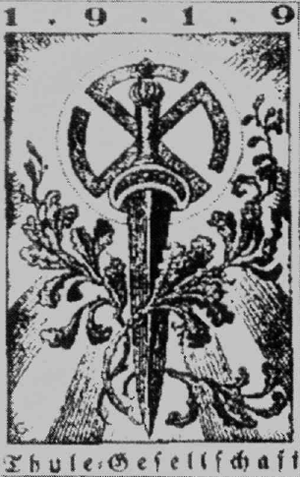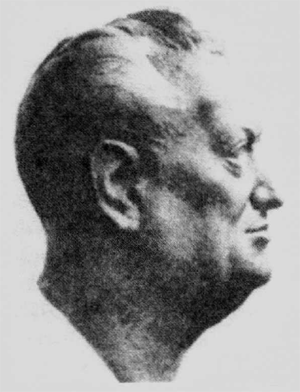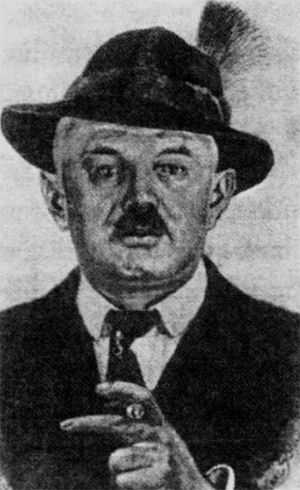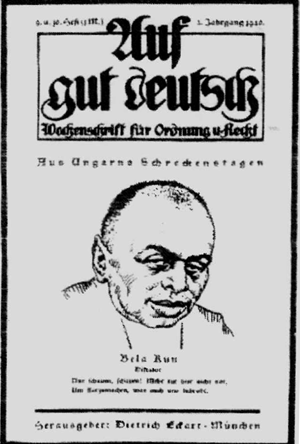1: Man of Letters" ... To understand Nazism ... we must limit ourselves strictly to the more prominent racist writers ... the central figure of which, among those surrounding Hitler, was Dietrich Eckart."
-- Ernst Nolte
Johann Dietrich Eckart was born on March 23, 1868 in Neumarkt, an Upper Palatinate town of 4,500 souls near Nuremberg. His mother, Anna Bosner Eckart, was the daughter of a Bavarian Army 'quartermaster. She tried to raise Dietrich and his three siblings as Catholics, though her husband was Evangelical Lutheran. Her youngest daughter died as a young child. Dietrich suffered from a variety of illnesses. Family members recollected that his mother always seemed to be nursing him back to health. Anna has been described as a dreamy and sensitive soul. Unfortunately, this delicate hausfrau died of influenza in her thirties during the winter of 1878. Ten year old Dietrich never recovered psychologically from that blow. Episodes of depression plagued him for the rest of his life.
Dietrich's father, Georg Christian Eckart, practiced law and served as Neumarkt's royal notary. In 1888 Prince Regent Luitpold appointed him a district justice. Christian Eckart had a reputation for being rough, but fair. Albert Reich asserted that "his word was rarely contradicted in Neumarkt." [1] Judge Eckart assumed a dictatorial mien, and treated local farmers as country bumpkins. Dietrich later emulated his father's decisiveness, air of authority, and readiness to pass judgment on others.
Eckart senior's professional duties completely preoccupied him. In 1879, one year after his wife's death, he accepted a civil service post in Nuremburg, twenty miles from Neumarkt. Like most workaholics Georg Christian left something to be desired as a father, alternately ignoring and browbeating Dietrich and Wilhelm. A Franconian Lutheran himself, the brusque official neglected his sons' Catholic education when his wife died. They could empathize with criminals brought before their father, who viewed him as arbitrary and reluctant to temper justice with mercy.
Possibly due to his mother's coddling, restraints of any kind were always onerous to Dietrich Eckart. Despite his intelligence, he became a disciplinary problem at several different schools. Though kindly toward friends, adversaries could quickly provoke his volatile temper and sharp tongue. He found it difficult to follow rules. Members of a rival political party later dubbed this tough guy as "the man with elephant skin," [2] but his rough exterior concealed a hypersensitive psyche. Young Eckart's chronic misbehavior resulted in expulsion from a school in Nuremberg circa 1884. Georg Christian then sent him to Schwabach's Lateinschule. When he got into trouble there, Judge Eckart enrolled his obstreperous son at Regensburg Realsgymnasium, where he finally graduated. At Regensburg Dietrich met lifelong friend Karl Guido von Bomhard, the headmaster's son.
Twenty year old Dietrich Eckart went off to the University of Erlangen in 1888. At his father's insistence, he studied law, but hated the subject and changed his major to medicine. Hitler claimed that Eckart told him that he terminated his legal training "so as not to become a perfect imbecile," [3] adding that "the mere fact of wanting to be a lawyer came from a mental deficiency." [4] The law school drop-out once suggested "nailing the present juridical doctrines to the pillory and publishing (them) in a form easily accessible to the German people." [5] Eckart's lifelong abhorrence of lawyers stemmed in part from resentment toward his father.
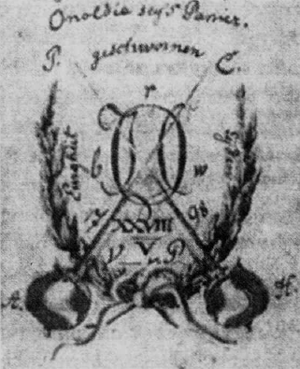 The emblem of Onofdia Corps Erlangen, Dietrich Eckart's college fraternity
The emblem of Onofdia Corps Erlangen, Dietrich Eckart's college fraternityAs a college student Dietrich willfully eschewed practical pursuits, devoting his efforts to poetry, drama, philosophy, fencing, and revelry. He joined his father's old dueling fraternity, The Onoldia Corps Erlangen (originally founded by Carl Freiherr von Pollnitz in 1798.) As a frat brother Eckart dueled, caroused, and fully indulged his appetite for mischief Though once suspended for misbehavior, he eventually became Onoldia's Master of Ceremonies. That office required him to write ditties which celebrated beer-drinking, comradeship, and German patriotism. Later in life he utilized this ability to write advertising slogans and song lyrics. The University recognized his literary talent by accepting a prologue he wrote for graduation ceremonies. In 1888 Eckart also received payment from Regensburg's leading newspaper for his eulogy commemorating the death of Emperor Wilhelm I.
Onoldia Corps fostered Eckart's life-long penchants for drinking, male camaraderie, song, and factionalism. German dueling fraternities served as hothouses for German nationalism and anti-Semitism. Although it had more of a reputation for partying than political activism, Onoldia Corps adopted the Teutonia Fraternity's "Aryan Clause" of 1877 which barred Jews and foreigners from membership.
While at Erlangen Eckart proposed to the daughter of a local school teacher. When the girl's father learned of the engagement, he broke it off immediately. This involuntary separation from a beloved female rekindled the trauma of his mother's untimely death, triggering a nervous breakdown that required hospitalization in a private sanitarium.
During his confinement Eckart wrote an article entitled "Hypnosis and the Novel" for Rudolf Heinrich Greinz's Cultural & Literary Illustrated. He theorized that the fictional characters dreamed up in creative "trance states" often represented authors' own alter egos. This topic suggests that Eckart underwent hypnosis therapy in the course of his treatment.
Dietrich Eckart became addicted to morphine in his early 20's. His friend Albert Reich claimed that a doctor administered the drug to treat a serious illness. Another story alleged that Eckart had access to morphine as a medical student. To deaden the pain of depression he sampled the drug and soon became hooked. Whatever the circumstances, his father had to send him back to the sanitarium for nearly two years. Eckart battled morphine dependency for the rest of his life. He would kick the habit a while, then go back to it. About his narcotic use Alfred Rosenberg wrote:
"without his sweet poison he could not live, and applied the whole cunning of a possessor of this craving to get himself dose after dose. Eventually he was taking measures from which a normal man, not (endowed with) such bear-like strength, would have died." [6]
His German biographer Margarete Plewnia has affirmed that Eckart was a cultured man, well-versed in works by Plutarch, Plato, Luther, Angelus Silesius, Pascal, Spinoza, Shakespeare, Ibsen, Goethe, Kant, Nietzsche, Schopenhauer, Heine, Nietzsche, and Bismarck. However, he could not resist the temptation to dip into sub-literature such as the anti-Semitic writings of Paul Lagarde, bogus psychology of Otto Weininger, pseudo-scientific theories of Ernst Haeckl, and Ariosophic fantasies of Guido von List. Of the mainstream thinkers, Heinrich Heine, Arthur Schopenhauer, and Angelus Silesius exerted the most influence on him as a young man.
In the course of his unsystematic reading at the University of Erlangen Eckart discovered Heinrich Heine and Arthur Schopenhauer, two authors of opposite temperament. The German-Jewish poet Heinrich Heine was his first literary model. He admired the "realistic romanticism" espoused by Heine's Young Germany movement, and his original style, which creatively utilized irony, slang, and poetic license. Eckart identified with the alienation his idol experienced as an expatriate artist victimized by philistines. Like Heine, he was attracted to poetry, theater, journalism, and philosophy. While convalescing at the Nerve Clinic, Eckart wrote "Heinrich Heine: A Selection of his Poetry for Women and Youths, with Foreword and Biography" (Leipzig, 1893.) In his adulatory preface he attacked the poet's critics as "bigots and reactionaries," [7] declaring that racial hatred was foreign to the noble German Spirit. Eckart strongly identified with Heine's
" ... lack of interest in formal studies, ... agony in setting out on a career, and ... difficulty in finding a place where he felt rooted." [8]
In later years Eckart would repudiate this hero of his youth, as well as his own juvenile liberalism.
Though he outgrew his enthusiasm for Heine, the pessimism of Arthur Schopenhauer's philosophy stayed with Eckart for life. In an epigrammatic style Schopenhauer's The World As Will and Idea argued that the human will strove toward no rational end. Men rarely got what they wanted and couldn't be satisfied with what they had. Schopenhauer's extensive reading of Buddhist scriptures strongly affected his philosophy. He accepted Buddha's view that most men were dazzled by Maya's illusory dance, and the Buddhist tenet that life consisted mainly of pain and ennui. Young Epicureans like Eckart might derive transient comfort from food, drink, sports, sexual love, art, the humanities, or a detached philosophical attitude, but they still had a spiritual duty to penetrate "Maya's Veil" (the world of appearances) and arrive at Truth.
Schopenhauer viewed "Romantic folly" as misleading and unphilosophical. Thus, he advocated literary realism with its anti-heroes and naturalistic depiction of life's seamier side ... Eckart's plain speaking and cynicism both derive from Schopenhauer's gloomy outlook. He shared Thomas Hobbes' view that life was "nasty, brutish, and short." Being upbeat indicated superficiality.
As a young man Dietrich Eckart also developed an appreciation for the poetry of Angelus Silesius, nom de plume of Johannes Scheffer (1624-1677), a German-Polish physician and priest educated at the University of Padua. Silesius wrote The Soul's Spiritual Delight, a hymn book, The Cherubic Pilgrim, a collection of poetry, and scores of theological treatises. Eckart especially liked Cherubic Pilgrim, which consisted of 1,600 rhymed couplets on religious themes. Although a convert from Lutheranism to Catholicism, Silesius admired the pantheism of occultist Jakob Boehme. A worn copy of Der Cherubinische Wandersmann always stood on Eckart's night stand. Its mystical verse reinforced his opposition to crass materialism.
Eckart returned from the hospital to Neumarkt in 1893 to pursue his dream of becoming a writer. Friends recalled him writing at a bar table, while others drank and played cards nearby. He published two books at his own expense: the appreciation of Heine, and "In the Foreign Land," a small volume of his own poetry. Eckart borrowed his title "In Der Fremde" from Heine's famous poem about alienation.
"In the Foreign Land" contains poems about fleeting youth, a prodigal son, and the anxieties of modern times. The longest poem, "Jordansblume" deals with Judaism. Ralph Engelman points out that "the length and subject of 'Jordansblue' suggest a preoccupation and element of identification with Jewry." [9] This work mentions the Jews' stateless plight and longing for a homeland. The writer speaks of his love for a pretty Jewish girl. "Because he enters the synagogue to observe her, she mistakes him for a pious Jew and smiles at him." [10] In adolescence Eckard found Jews exotic and intriguing. As the years went on, their image morphed into his nemesis, an alien "alter ego" which he reviled.
Eckard became an avid admirer of Wagner's operas as a young man. The ambience of Bayreuth during the festival thoroughly entranced him. Hitler, who accompanied him there in 1923, confirmed that "Eckart ... had always tole me of the extraordinary atmosphere prevailing there." [11]
The Augsburg Evening Times Literary supplement accepted a few articles and poems from Eckart in 1893, including an essay about Germany's long term prospects entitled "A Question on our Future." Sammler Magazine published two short stories. He convinced the Evening Times to let him cover the Wagnerfest in June, 1894. His "Letters from Bayreuth" praised Wagner, while deriding ticket-scalpers, ostentatious foreigners, and the inferior quality of some performances. This popular series was picked up by several newspapers, including Bayreuther Briefe and Munchener Abendzeitung. Eckart's reputation as a witty critic helped him sell articles on art, culture, and politics to the same papers. Cosima Wagner, the composer's widow, invited him to one of her parties. Shortly after that soiree the Bayreuth Festival commissioned him to write program notes for Parsifal.
Eckart published a fictional travelogue entitled Tannhauser auf Urlaub in 1895 which evaluated the condition of various German cities through the eyes of reincarnated 13th Century poet, Heinrich Tannhauser. This oracle favored liberty, equality, fraternity, and German idealism, but abhorred the leveling effect of democracy and socialism. He excoriated Reichstag deputies as garrulous egotists who didn't really care about their constituents. Tannhauser auf Urlaub contained Eckart's first anti-Semitic comments, which he expressed "with sorrow, noting his love for Jewry." [12]
"Their rigid letter-of-the-law religion instills clandestine hatred for the descendants of their ancient enemies and oppressors. They stand apart with their superior cleverness and ambition ... It's the duty of every thoughtful Jew to work energetically toward the reorganization of his people. Therefore no accommodation is possible ... We must always brandish the hammer if we don't want to become the anvil." [13]
In his preface Eckart claimed to love Jews' "excellent spirit," though he had reservations about their "egomania." He naively asserted that emancipated Jews had the duty to control wayward brethren -- as if individual Germans could reform their own scoundrels.
After a token nod to Jewish intelligence, Tannhauser pompously asserted that Jews must be denied a role in the coming Pan-German super-state because of their obsessions with "sensuality, materialism, and the present." [14] Like Wagner's Minnesingers young Germans must fight "the common vermin that crawl out of those big sacks of money and pollute the whole atmosphere." [15] Tannhauser auf Urlaub attacked parvenu mores and proclaimed that the New Germany demanded values based on high ideals, not man's lower nature.
Following his father's death in 1895, Eckart inherited a substantial amount of money. In early 1896 he made his first trip to Berlin to see the opening of Hauptmann's play Die Versunkene Glocke. The capital's bustling dynamism impressed him, but he decided to rent quarters in Regensburg, where he had previously attended boarding school with his friend Karl Guido Bomhard. After a year, Eckart decided to move on to Leipzig, the center of German publishing, with the intention of setting up a salon there.
Konrad Heiden described Eckart as "a Swabian who appreciated good living." [16] He was a trencherman who could easily consume twenty sausages along with tureen of sauerkraut, while washing all down with six pints of beer. A connoisseur of coffee, Eckart bought gourmet roasted beans from South America and Africa, then ground them with his hand-crank coffee mill every morning. When flush with money, he smoked fifteen or more cigars per day. All forms of alcohol appealed to him: beer, wine, schnapps, whiskey, absinthe. In the course of his life, he carried on several love affairs. Rumor had it that he engaged in homosexuality in his youth, and again while broke in Berlin between 1906 and 1911. Besides those indulgences, he took morphine almost continuously. His restless wanderings from Neumarkt to Regensburg, Leipzig, Berlin, Bad Blankenburg, Munich, and Berchtesgaden might have been "geographic solutions" -- futile attempts to escape the consequences of substance abuse by moving to new places.
Always a big spender, and generous with friends, Eckart squandered his patrimony on high living in Leipzig. According to Alfred Rosenberg he simply "could not say no to a friend and would give up his last cent even if it meant (going) without." [17] Wanting to recreate the festivity of Onoldia Corps, Eckart fully indulged his tastes for alcohol and humorous repartee as a habitue of Leipzig's bar scene.
By 1897 his funds ran low. Morphine use took a monetary and physical toll. He left Leipzig and went back to Regensburg to nurse himself back to health. While there he wrote a four page article that would later appear in Sammler Magazine's September 16, 1899 edition, "The Culture of the 19th Century," which extolled the realism of Heine, Balzac, Schopenhauer, and Ibsen, while scoffing at hazy symbolic works written by "nervous weaklings." However, he warned that lurid naturalism could never create an inspiring vision for New Germany.
Migration to Berlin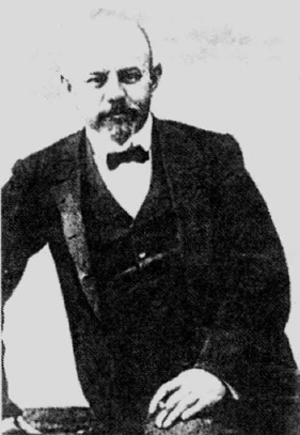 Dietrich Eckart, c. 1900
Dietrich Eckart, c. 1900After more than a year of convalescence, Eckart moved to Berlin in the autumn of 1899. Germany's new capital, with its forty theaters, plethora of newspapers, and world-class orchestra, had become the Empire's cultural center. Theater critic Willy Haas described the city's vitality in Die Literarische Welt:
"'I loved the rapid, quick-witted reply of the Berlin woman above everything, the keen, clear reaction of the Berlin audience in the theater, in the cabaret, on the street, and in the cafe, that taking-nothing-solemnly yet taking seriously of things, that lovely, dry, cool and yet not cold atmosphere, the indescribable dynamic, the love for work, the readiness to take hard blows--- and go on living." [18]
Eckart joined thousands of immigrants to Berlin. The city had grown from a town to major metropolis since Napoleon's defeat in 1812. Its Jewish population increased thirty-fold during that same period. However, very few were of the Ostjuden variety. Berlin's Jews had a reputation for being intelligent, secular, and well-assimilated.
The publication of three articles in Sammler magazine kept Eckart solvent for the remainder of 1899. In early 1900 he worked briefly for August Scherl's tabloid Lokalanzeiger, but intensely disliked its shallowness and lack of German values. He came to see himself as a Teutonic sage in the modern world. The Morning hired him in 1901. For that paper he wrote not only news reports and opinion columns, but play reviews, poems, short stories, and a serialized novella which satirized the German press. Unfortunately, this dream job ended when The Morning went bankrupt four months later. Eckart recycled his criticisms of nihilistic modern journalism into a tragicomedy entitled Familienvater.
In 1901 Germany's premiere humor magazine, Simplicissmus, devoted an entire issue to his short story "Der Kleine Martin Bauz," which poked fun at the abysmal "guidance" given an eight year old boy by his teacher, doctor, pastor, and drunken parents. "Martin Bauz" highlighted the breakdown of values besetting turn-of-the century Germany.
With encouragement from friends Eckart published four articles and several poems in Buhne und Brettle Magazine between March and May, 1902. This periodical had changed from a theatrical review to a journal of political commentary. One issue, illustrated with caricatures and accompanied by unsigned "Eckartian" verse, lampooned the "monolithic Jewish clique" which allegedly controlled Berlin theater. Those satirized included Siegfried Jacobsohn, Fritz Engel, Georg Hirschfeld, Oscar Bies, Maximilien Harden, Hermann Sudermann, Max Osborn, Alfred Klaar, and Max Reinhardt. In one article Eckart referred to Jewish playwrights George Hirschfeld and Hermann Suderman as "ghetto writers" [19] who treated drama as "just another commodity." [20]
In the early 1900's Eckart reinforced his Judeophobic bigotry by reading excerpts from Henri-Roger Gougenot des Mousseaux's The Jew, Judaism, and the Judaization of Christian Peoples (1869), originally published in France. Gougenot des Mousseaux (1805-1876), a minor French nobleman of bookish disposition, acquired the reputation of an authority on magic, Celtic folklore, ultramontane Catholicism, and demonology -- the field of study which guided his efforts to demonize Jews. His anti-Jewish invective bridged the gap between theological and modern anti-Semitism. He held that Christianity had rendered Judaism obsolete over 1,800 years ago. Thus, contemporary Jews, like the devil, were incorrigible deniers of revealed truth.
St. Paul declared Satan "Prince of the Air" (or Physical World.) Because they combined alleged prurience with phenomenal acumen for commerce and dialectical reasoning, Gougenot surmised that Jews might be the products of interbreeding between demons and humans. Jewish influence had burgeoned since the emergence of France's middle class after the 1789 Revolution in almost direct proportion to the debilitation of Church and aristocracy. In alliance with Freemasons Jews now threatened to take over Europe. Gougenot blamed them for every crisis, including gentile bank failures, the Franco-Prussian War, and deterioration of established moral standards.
In his capacity as President of Coulommiers' St. Vincent DePaul Society chapter, Gougenot met Vatican librarian David Paul Drach (1791-1868), a former rabbi who converted to Catholicism. Archbishop Quelen of Paris baptized Drach, his two daughters, and son on Holy Saturday, 1823. Shortly after his conversation, Drach's Jewish wife disappeared with their three children. Two years later, following a widely publicized police investigation and lawsuit, he divorced his wife, obtained custody of the children, and embarked on the career of a Catholic scholar. With the Holy See's imprimatur Drach published several books, including a new French Bible translation, Hebrew-Latin dictionary, learned treatise on the Jewish Kaballah, and his most popular work, Letters of a Converted Rabbi to his Brethren. Gougenot des Mousseaux used information about the Talmud supplied by Drach, as well as his own encyclopedic knowledge of devil-lore to weave a tale of organized Jewish treachery. He attributed such diabolical traits as deceit, pride, cunning, and wickedness to Jews, noting that they also shared Satan's propensity to roam earth's ends for the purpose of sowing discord. Just as Beelzebub, Baphomet, and Belial instructed their agents to circulate the untruth that devils did not exist, Jews contradicted all rumors that they were involved in a conspiracy for world domination. Gougenot, who wrote at the time of Pasteur's discoveries, might have been the first pundit to compare Jews to invisible microbes that subtly "infected" western civilization with the diseases of secularization and socialism. His writings strongly influenced the next generation of French anti-Semites, including Edouard Drumont, a leading anti-Dreyfusard, and Fascist ideologist Charles Maurras.
Eckart lapped up the scathing misrepresentations of Gougenot des Mousseaux, paying special heed to his prophecy that Jews would create much mischief in Germany, then suffer a devastating payback in return. During the early 1920's Eckart persuaded Alfred Rosenberg to translate Gougenot's book into German under the tide, The Eternal Jew.
Thirty-four year old Eckart turned into an intellectual thug by 1902. His excessive drinking produced characteristic behavioral changes: egocentricity, mood swings, excitability, strong biases, and a propensity to turn against former friends. He had the alcoholic's tender and swollen ego, which made him unable to accept criticism, and quick to blame others for his problems. Fault-finding became his modus operandi. To preserve his own unassailable dignity he tore down others, including close associates. During his Berlin period Eckart decided that his career setbacks were not due to personal shortcomings, but the pernicious influence of Jewish-controlled media. Ugly words such as "stooges," and "Judenkitsch" crept into his vocabulary. Though he did not yet have the temerity to attack individual Jews by name in signed articles, Eckart employed such derogatory terms as "yids" and "slick Cohns." [21]
According to him Jews had cornered the German literature market. They owned thirteen of Berlin's twenty-one daily newspapers, and several book publishing companies. The publishing houses of Rudolf Mosse and Leopold Ullstein determined who would succeed and who wouldn't. They had what poet Gottfried Benn called the Jewish merchant's "absolute .. , instinct for quality." [22] Mosse had acquired four papers in Berlin alone: The Berlin Daily News, The Morning Times, The People's Times, and Business Daily News. Ullstein presided over the Evening Post, Illustrated Times, New Berlin Daily News, and Berlin Midday Times. According to Eckart, Mosse and Ullstein promoted scribblers churning out drivel, while snubbing genuine German artists like himself He asserted that over half of Berlin's twenty-one newspapers were Jewish-owned, as well as all three of the city's satire magazines. He deeply resented Jewish editors such as Theodor Wolff of the Berliner Tageblatt, Georg Bernhard of the Vossiche Zeitung, and Bernhard Guttmann of the Frankfurter Zeitung, who exerted real power, while he couldn't even hang onto a steady job. To him these men represented "the antithesis of authentic German life." [23]
"The press and theater in Berlin became the model for (his) understanding of the illegitimate powers which were usurping authority in the twentieth century." [24]
Ullstein Verlag did wield enormous influence, which could make or break authors.
"Ullstein's monopolizing of outlets ... made many writers profoundly uneasy, (and) produced ... an unhealthy, eventually lethal, division between those who belonged and those who did not. For a writer without private income, the favor of Ullstein meant luxury, its indifference or disfavor, near-starvation." [25]
Under this system nationalistic writers faced obscurity and failure. Dietrich Eckart's volkisch pieces struck big city editors as provincial and reactionary. Modern readers wanted fresh, cosmopolitan material. They were neither interested in Teutonic chauvinism, nor romantic treatments of German history. Thus, Eckart felt the necessity for "a counter-press and counter-culture" to present his views. In coming years he would bypass Germany's publishing establishment with vanity press ventures such as Herold Verlag and Hoheneichen Verlag.
Because of his festering Judeophobia Eckart's reverent attitude toward Heinrich Heine altered. In an entire 1919 issue of Auf Gut Deutsch magazine he denounced his former idol, "Chaim Heine," for "cunning deceit and lack of Germanic purity." [26] The poet's emigration to Paris in 1831 unmasked him as a rootless "International Jew."
"How many Galician Jews have first become Germans, then Englishmen, and finally Americans. And each time in the twinkling of an eye. With startling rapidity they change their nationality back and forth." [27]
Eckart also frowned on Jews who changed their surnames -- though future protege Adolf Hitler's father had done the same thing, amending his last name from Schicklgruber to Hitler.
Dietrich Eckart's German patriotism approached the blind loyalty of family love. Hence, he took exception to Heine's ambivalence about Germany.
"Heine ... writes an utterly vulgar poem about Germany; five minutes later he is praising '(our) dear homeland' to the skies. A matter of changing mood? Oh, dear God, I suppose we are to believe an old street whore often finds herself in the mood to sing 'Ave Maria,' or that a basically honest fellow is often in the mood to steal. What nonsense!" [28]
Eckart hailed literary critic Wolfgang Menzel's suggestion that Heine's "Young Germany" group should be renamed the "Young Palestine Movement." He viewed himself as a wronged idealist, and accused Jews of ruining Germany. In his view they were responsible for shady business practices which lowered the quality of life on earth. Germany's "economic miracle" (c. 1866-1914) occurred during his lifetime. Utilizing loan capital from banks and the stock exchange, corporations built steel works, machine tool factories, warships, railroads, automobile assembly lines, and chemical plants. This rapid technological progress caused unprecedented social upheaval. Like other left-behind Germans, Eckart held the less-than-l % Jewish minority culpable for the dislocating consequences of industrialization, urbanization, political unrest, modernity, and erosion of old-fashioned values.
Eckart settled in Berlin because he perceived it as the center of German civilization. However, by 1905 the impersonal capital had dashed his hopes.
" ...The city contained the most advanced form of what Eckart viewed as ... disruptive forces of chaos: finance capitalism and socialism, the anonymity and lack of community of the big city, mass communication and cultural pluralism. It was a magnet for German Jewry, which he considered the embodiment of these phenomena." [29]
Dietrich Eckart had strong likes and dislikes. He loved Wagnerian opera, volkisch drama, comrades-in-arms, morphine, coffee, tobacco, Bavarian beers, and Rhenish wines, but hated lawyers, Jews, pacifists, and unsympathetic literary critics. His inability to obtain employment commensurate with ambitions engendered what Margarete Plewnia termed "his monomaniacal obsession ... with Jews." [30] In Eckart's mind their chicanery spawned the painful anxiety he felt every day of his adult life.
As a Bohemian in Berlin, Eckart built up the reputation as a "metaphysical poet," concerned with "soul's involvement and detachment from the world." [31] In an effort to understand "that Genius higher than human," he perused Theosophical works. His interest in occultism brought him into casual contact with
Franz Hartmann, Hugo Vollrath, and
Rudolf Steiner. Eckart attended lectures at the Theosophical Society, and probably read the 1903 German translation of
Madame Blavatsky's Secret Doctrine. Adolf Josef Lanz von Liebenfals, Viennese author of the racist
TheoZoology (1904), claimed that Eckart exchanged letters with him circa 1905, and esteemed his work so much that he "plagiarized" it.
When Ralph Engelman went through Eckart's papers in 1969 he found a dog-eared address book containing "the names and calling-cards of an occasional nobleman, diplomat, professor and officer," as well as scores of "unknown painters, sculptors, architects, actors, ... singers ... " [32] Bohemian poet Eckart socialized with people of all classes, from laborers to aristocrats. Solitude got him down at times. Therefore, except for those occasions when he suffered from clinical depression, he sought the company of others. As an alternately convivial and morose man-about-town, he hung out in bars and regularly went to plays and operas. Over the years his gregariousness led him to join several organizations: the Onoldia Corps Erlangen Fraternity, Fichte-Bund, Berlin Press Club, List Society, Hammer Union, Theosophical Society, Theater Guild, The Wagner Society, Nazi Party, and so on.
In Berlin Eckart experienced both triumphs and humiliations. Spurned by editors with trendy tastes, he submitted his manuscripts to the conservative market. Ultimately, his
"career as a dramatist seemed to confirm his worst suspicions about the press and theater, and provided the springboard for ... political involvement." [33]
Eckart's first published play Der Kleine Zacharias (1903) juxtaposed a genuine artist with a prosperous sell-out who pandered to the public's vulgarity. Most of Eckart's dramas were based on the premise of idealists being victimized by connivers. Though only performed briefly in Luneburg, Der Kleine Zacharias attracted a small cult following.
In 1904 Eckart met Georg Graf von Huelsen-Haeseler, superintendent of the The Royal State Theater, and nephew of military chief of staff, General Dietrich von Huelsen-Haesler. Between 1905 and 1918 he sent over a hundred letters to this patron. Huelsen-Haeseler agreed to produce Familienvater, a melodrama about idealistic reporter Heiderich, who works for a metropolitan daily owned by a villainous converted Jew named Heinze. When Heinze fires Timroth, a paterfamilias with eight children, Heiderich promises to support his brood by producing a play exposing the evils of modern journalism. Alarmed when audiences cheered themselves hoarse at sold-out performances, Heinze utilized his clout with corrupt politicians to close down the production for hyping anarchy. In despair, Heiderich commits suicide. Familienvater had runs in Regensburg, Hanover, Munich, Neumarkt, Graz, Vienna, and other cities, but barely broke even. Eckart suspected that Berlin's "Jewish cabal" scotched it because of his Pan- German and pro-Wagner sympathies. Frau Nahilde Ruth Lazarus, a gentile literary critic married to a Jewish professor, had faulted the play for its onedimensional Jewish stereotypes.
Through most of 1905 Eckart worked as an editor for the Deutscher Blatt newspaper. He exulted when Huelsen-Haeseler agreed to stage The Frog King (written in 1898.) Albert Reich remembered his friend triumphantly passing around the telegram of acceptance in a bar. Since the Royal Theater almost never produced new works, Eckart had scored a coup. Based loosely on the Grimm fairy tale, Der Froschkoenig portrayed the life of a swindler who preyed upon upper middle-class Germans. When Gerda, the pretty daughter of a wealthy businessman attempted to convert him from his life of crime, he refused. In such a fallen world one must be a blackguard to succeed. Much of the dialogue reflected Schopenhauer's fatalism. The Frog Prince informed Gerda that
"man is his own maker, his own creation. However a man is, so he himself willed, even before he was. ... How can we feel guilty about the 'bad' in us? Nothing we do produces any repentance, so therefore we have none. As we are, so we must act, according to our inborn unalterable character ... but because we are this way and have no 'better' character-- ... for that we are responsible, and ... must someday pay!" [34]
Unfortunately, this existential amphibian from fairyland failed to enchant theatergoers. Euphoric during November rehearsals with director Max Staegemans, Eckart was crushed when the audience booed and hissed the play on opening night. One dissatisfied customer in the balcony whistled through a house key during the entire last act. Der Frosch Koenig bombed spectacularly, closing after four performances. In a letter to his teenaged friend Xaver Steinbach, Eckart wrote that Huelsen-Haeseler told him "the public and the press," [35] were responsible for the Frog King debacle. Meanwhile, he lashed our at Berlin's philistine public, the "Jewish conspiracy" against him, and lead actor Adalbert Mattkowsky's lackluster performance. According to the disgruntled playwright, all critics who panned his masterpiece were lackeys of Berlin's "Jewish theater monopoly." He went into a depression, got physically ill, quit his job at the Deutscher Blatt, and returned to Neumarkt, where weary relatives put him up for months. Dr. Paul Hermann Wiedeburg later confirmed that Eckart suffered a nervous breakdown-"a heavy, painful ... two year illness surrounded by darkness ... for which he took morphine." [36] On July 17, 1907, while still convalescing from the Frog King trauma, Eckart gave a copy of the play to his niece Mitzi with a melancholy dedication written in verse.
"You seek happiness and wander about, as the waves meander across the sea, until they're broken on a rock; a short flicker, a swishing flutter, and above you and your dream, oblivion dashes over."
The Hunger YearsStill smarting from the Frog King disaster, Eckart wrote very little in 1906. His debts mounted because he accepted conditional advances on plays that earned nothing. Nevertheless, Huelsen-Haeseler treated him kindly, sending hundreds of marks over the next few years, and forgiving advance-refunds owed back to The Royal Theater.
Between 1906 and 1910 Eckart led a threadbare existence, surviving by freelance writing, pawnshop barter, hand-outs from friends, and credit extended by the owner of the Alt Bayern pub on Potsdammerstrasse, where he was a regular. Artist Albert Reich grew up with Eckart in Neumarkt and reconnected with him in the Steglitz section of southwestern Berlin. According to him, he occupied various tenements during his "Hunger Years." The many different return addresses on Eckart's correspondence with Geog Graf von Huelsen-Haeseler indicated frequent changes of residence between 1905 and 1910. For a while he shared a "rear bachelor flat" in The Black Piglet Rooming House at 11 Felderstrasse with an impecunious actor named Otto Fitzsche, and Paul Haase, an underemployed painter. Eckart's niece, Frau Claire Lormer-Schneider, heatedly denied rumors that her uncle had lived like a bum in Berlin. On January 31, 1936 she fired off a letter to the National Socialist Archive insisting that Eckart never had to rack out on park benches, since loving family members resided in a comfortable suburb of Berlin. However, his friend Albert Reich claimed that during the lowest period, circa 1908, Eckart occasionally slept on a "favorite park bench" [37] in Berlin's Tiergarten (zoological gardens.)
In the course of his 1906-to-1910 downward spiral friends mailed Eckart "care packages" containing toiletries, food, and schnapps. He freeloaded on his brother Wilhelm and family in Doeberlitz for weeks at a time. While there he developed closer relationships with nephew Hans and nieces Claire and Mitzi. Though Eckart never suffered from physical starvation during the "Hunger Years," his longing for professional fulfillment went unsatisfied. These failure pangs, combined with feelings of being wronged, scarred him for life, and intensified his revulsion toward Jews.
Being a sponger deeply wounded Eckart's vanity. But he had no choice. Many of his letters from this time rationalized his loss of status, then entreated friends for money. He even shook down adolescent friend Xaver Steinbach for cash. Eckart's letters to Royal Theater Superintendent Georg von Huelsen-Haeseler reveal his plight. In November, 1905 he asked if this patron could get him a job with the Theater. A March, 1906 letter confirmed: "all my attempts to find employment have failed." [38] He played the martyred great master in his epistle of December, 1908:
"Even if I cut my bread money in half and write articles for the daily press, I can expect ninety rejections from one hundred inquiries. Almost all respond in a like manner: my work is, indeed, out of the ordinary, penetrating and interesting, but not for the public at large ... It cannot therefore, be my lack of talent that brings me ever nearer to the brink of ruin ... or my diligence ... It must be due to my Weltanschaung -- to my animosity to every dull, hackneyed thing of our time ... " [39]
Eckart then asked Huelsen-Haeseler for money and added:
"if I did not firmly believe in my ability for dramatic representation or the possibility to redeem my indebtedness to Your Excellency, then I would creep into the 'most miserable hole of this hard city rather than become a burden to Your Excellency's generosity." [40]
Huelsen-Haeseler showed this letter to Kaiser Wilhelm, who pronounced it "a masterpiece of the 'pump art.'" [41]
In a December, 1907 note to Hueslsen-Haeseler Eckart described his ordeal as "a moral trial." [42] His plaintive letters echoed Schopenhauer's essays on literature. The philosopher damned the public for mistaking newest for best, and authors because they "lived on literature, rather than for it." [43] He declared that the "new is seldom good (and)... a good thing is only new for a short time." [44] Schopenhauer condemned commercial publishing for perpetually inventing new fallacies to stimulate sales. The superficial epicycles of fashion contradicted each other. Yet, the public acclaimed frauds who traded in this transitory world of illusion, and boycotted artists who "were tormented without recognition (in their lifetimes) ... whilst fame, honor, and riches fell to the lot of ... worthless hacks." [45]
In 1907 Eckart wrote Der Erbgraf, a drama he couldn't sell , which related the plight of a young nobleman driven to suicide by the tawdriness of modern society. In 1910 he finished Ein X-Belieber Mensch, an adaption of Charles Dickens' Our Mutual Friend, which never saw the light of day. Like the Frog King, X-Belieber Man revived and embellished an existing work. This set the pattern for his final period as a dramatist. Instead of confecting new plays from scratch Eckart injected Peer Gynt, Henry Hohenstaufen, and Lorenzaccio with volkisch notions, then livened them up with his aphoristic style. Two years later he finished Ein Ked, Der Spekuliert about Jewish water heater and chemical manufacturer Moritz Silberstahl ("silver stealer") who also sold quack nostrums. Eckart later claimed that the play was never performed because he refused to comply with Jewish impresario Alfred Halm's demand that Silberstahl be deleted, or transformed into a gentile. As Eckart recounted in Auf Gut Deutsch.
" ... I found a publisher. .. , a wealthy one at that. He was enthusiastic about the piece, and gave me a hundred mark advance ... without even a whimper. Before long he directed me to go see Alfred Halm, then head of Berliner Theater. He, too, was enthusiastic as hell about it. I went and was received by Halm with the words: 'finally someone who can write a German drama!' ... 'The whole thing is great, excepting the figure Moritz Silberstahl. .. Do you feel him very important?' (Eckart replied:) 'My Mortiz! He must not be cut out!' ... (Halm responded:) 'I'd be sorry if he doesn't get written out because then I couldn't produce the play ... He'd make the audience restless ... You seem to forget. .. we have a large number of Jews in the crowd, our very best customers. A chatterbox like your Silberstahl -- out of the question -- he'd never be tolerated ... " [46]
Eckart's unwillingness to compromise killed the deal. To his young friend Xaver Steinbach in Neumarkt he wrote that he might adopt a "Jewish pseudonym" [47] in order to win over the critics.
Believing himself to be an unappreciated genius, Eckart let his anti-Semitic prejudices burgeon between 1902 and 1918. He joined the nationalistic Fichte-Bund, Theodor Fritsch's anti-Semitic Hammer Union, and studied the racial theories of
Guido von List and Adolf Josef Lam von Liebenfals. His paranoia about Jews repeatedly surfaced in letters to Huelsen-Haeseler: "the enemies of my convictions, that is, the Jews, are everywhere I go -- busy with their crafty work." [48] He thought they would cause him to have another nervous collapse. In an apparent cry from the heart Eckart subsequently wrote that Jews drove "men to despair, to madness, to ruin." [49] Traumatized by early 20th Century Germany's accelerating pace of change, he blamed the disconnectedness of contemporary life on Jewish influence.
Albert Reich remembered an afternoon circa 1909 in the Old Bavarian Pub, when Eckart had just spent his last pfennig on drink. A pharmaceutical salesman sauntered in and mentioned that his firm was looking for a catchy jingle to promote "gout water." Eckart disappeared into the bathroom for a few moments, then reappeared at a corner table where he dashed off four rhymed lines, which the company bought for 1,000 marks. Although an excellent "Reklamedichter" (ad copywriter), he did not often capitalize on this knack, feeling that such work was beneath his dignity as a poet.
At this same time forty year old Eckart acquired a seventeen year old girlfriend named Eleonore. Topping that, he somehow managed to extract an 1,800 mark "loan" from her father, which he never repaid. In 1924 Eleonore Holthausen, then a married woman with children, tried unsuccessfully to recover this money from Eckart's estate. Despite his "unfaithfulness" [50] and failure to reimburse her father, she did not harbor bitter feelings toward him, realizing that "artists, after all, must have freedom to create great works of art." [51]
Roommate Otto Fritzsche noticed Eckart's extreme moodiness. He would be affable one day, and anti-social the next. By 1909
"his sense of shame and rage led him to withdraw progressively into a small group of intimates ... He developed a habit of locking himself in his room and refusing to see anyone in order to avoid creditors, publishers, agents, and all others to whom he had obligations." [52]
Eckart's manic-depression produced mood swings that made him a truculent blowhard one day and shrinking violet the next. After his relationship with Eleonore unraveled, he again slid into the Slough of Despond, moping in his room for days. One of his neighbors, architect Ernst Rossius-Rhyn, observed that he seemed "a most lonely man ... always sunk in his thoughts ... " [53] Physically ravaged by substance abuse, dejected about his stalled career and failed romance, Eckart again checked into an asylum.
The downtrodden author kept himself afloat by writing popular magazine articles, humorous verse, and advertising copy for manufacturers of perfume, shampoo, and hair pomade. Some friends in Neumarkt started a spring water bottling company, Neumarkter Natur-Brunnen. Eckart received shares for putting together an advertising campaign, but this venture went nowhere. Though still destitute in 1910, Eckart somehow raised 5,000 marks to invest in Die Neu Aeroplan-Baugesellschaft, an airplane factory set up by Karl Guido Bomhard and his partner Josef Sablatnig, who later established the Fokker Aircraft Co. Despite his dire straits, Eckart still "spent a small fortune on beer, ... wine, and entertaining drinking chums." [54]
_______________
Endnotes1 Ralph Max Engelman, Dietrich Eckart and the Genesis of Nazism, UMI, Ann Arbor, MI, 1971, p. 3, op. cit. Albert Reich, Dietrich Eckart, Munich, 1933, p. 7.
2 Ibid., p. 192, op. cit Volkisher Beobachter, 3/15/1921.
3 Hugh Trevor-Roper, editor, Hitler's Secret Conversations 1941-1944, trans. Norman Cameron and R. H. Stevens, Farrar, Straus and Young, New York, 1953, p. 306, Hitler's conversation of 3/29/1942.
4 Ibid., p. 215, Hitler's conversation of 1/30/1942.
5 Ibid., p. 306, Hitler's conversation of 3/29/1942.
6. James Webb, The Occult Establishment, Open Court Publishing Co., LaSalle, IL, 1976, p. 283, op. dt. Alfred Rosenberg, Dietrich Eckart: Ein Vermachtis (A Legacy), Franz Eher Verlag, Munich, 1928.
7 Engelman, p. 8.
8 Ibid., p. 11.
9 Ibid.
10 Ibid., p. 10, op. cit. Dietrich Eckart In der Fremde, Leipzig, 1893.
11 Hugh Trevor-Roper, editor, Hitler's Secret Conversations, trans. Norman Cameron and R. H. Stevens, Farrar, Strauss & Young, New York, 1953, p. 283, Hitler's conversation of 2/28/1942.
12 Engelman, p. 19.
13 Ibid., p.20, op. cit. D. Eckart Tannhauser auf Urlaub.
14 Margarete Plewnia, Auf Dem Weg Zu Hitler: Der Volkische Publizist Dietrich Eckart, Schunemann Universitatasverlag, Bremen, 1971, p. 14.
15 Ibid., op. cit. Eckart, Tannhauser auf Urlaub.
16 William Gillespie, "Dietrich Eckart: An Introduction for the English-Speaking Student," vnnforum.com, 1975, op. cit. Alfred Rosenberg, Ein Vermachtis (A Legacy), p. 25.
37 Gillespie, op. cit. Albert Reich, Dietrich Eckart-Vorkampfer der NS-Bewegung, Munich, 1933, p. 60.
38 Plewnia, p. 20.
39 Ibid.
40 Ibid.
41 Ibid.
42 Engelman, p. 55, op. cit. D.E. December, 1907 letter to Georg Graf von Huelsen- Haeseler.
43 Arthur Schopenhauer, "On Authorship and Style," etext.library.Adelaide.edu.au, p. 4.
44 Ibid.
45 Arthur Schopenhauer, "On Reading and Books," extext.library.Adeiaide.edu.au, p. 9, op. cit. Georg Christoph Lichtenberg, Collected Works, Vol. II, p. 302.
46 Gillespie, pp. 5-6, op. cit. Dietrich Eckart, Auf Gut Deutsch, January 31, 1919.
47 Plewnia, p. 20, op. cit. D.E. 3/14/1906 letter to Xaver Steinbach.
48 Ibid., p. 57 D.E. letter to Georg Graf Huelsen-Haeseler, 4/17/1917.
49 Eckart, Chapter VIII, p. 1.
50 Engelman, p. 59.
51 Ibid., p. 60, op. cit. January, 1924 letter of Frau Eleonore Holthausen, Eckart Estate Papers, Anna Obster Rosner, custodian.
52 Ibid.
53 Ibid., p. 15, op. cit. Ernst Rossius-Rhyn, article in Illustrierte Zeitschrift fur Volk, Arbeit und Aufbau, 1934.
54 Gillespie, op. cit. Alfred Rosenberg, Dietrich Eckart, Ein Vermachtis, p. 25.
